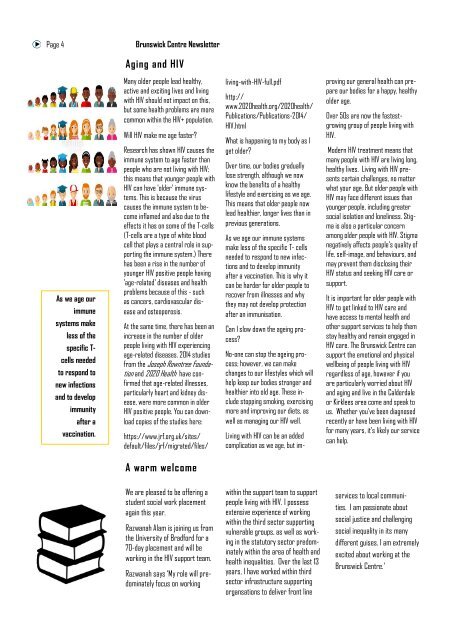Create successful ePaper yourself
Turn your PDF publications into a flip-book with our unique Google optimized e-Paper software.
Page 4<br />
<strong>Brunswick</strong> <strong>Centre</strong> <strong>Newsletter</strong><br />
Aging and HIV<br />
Caption describing picture<br />
or graphic.<br />
As we age our<br />
immune<br />
systems make<br />
less of the<br />
specific T-<br />
cells needed<br />
to respond to<br />
new infections<br />
and to develop<br />
immunity<br />
after a<br />
vaccination.<br />
Many older people lead healthy,<br />
active and exciting lives and living<br />
with HIV should not impact on this,<br />
but some health problems are more<br />
common within the HIV+ population.<br />
Will HIV make me age faster?<br />
Research has shown HIV causes the<br />
immune system to age faster than<br />
people who are not living with HIV;<br />
this means that younger people with<br />
HIV can have 'older' immune systems.<br />
This is because the virus<br />
causes the immune system to become<br />
inflamed and also due to the<br />
effects it has on some of the T-cells<br />
(T-cells are a type of white blood<br />
cell that plays a central role in supporting<br />
the immune system.) There<br />
has been a rise in the number of<br />
younger HIV positive people having<br />
'age-related' diseases and health<br />
problems because of this - such<br />
as cancers, cardiovascular disease<br />
and osteoporosis.<br />
At the same time, there has been an<br />
increase in the number of older<br />
people living with HIV experiencing<br />
age-related diseases. 2014 studies<br />
from the Joseph Rowntree Foundation<br />
and 2020 Health have confirmed<br />
that age-related illnesses,<br />
particularly heart and kidney disease,<br />
were more common in older<br />
HIV positive people. You can download<br />
copies of the studies here:<br />
https://www.jrf.org.uk/sites/<br />
default/files/jrf/migrated/files/<br />
living-with-HIV-full.pdf<br />
http://<br />
www.2020health.org/2020health/<br />
Publications/Publications-2014/<br />
HIV.html<br />
What is happening to my body as I<br />
get older?<br />
Over time, our bodies gradually<br />
lose strength, although we now<br />
know the benefits of a healthy<br />
lifestyle and exercising as we age.<br />
This means that older people now<br />
lead healthier, longer lives than in<br />
previous generations.<br />
As we age our immune systems<br />
make less of the specific T- cells<br />
needed to respond to new infections<br />
and to develop immunity<br />
after a vaccination. This is why it<br />
can be harder for older people to<br />
recover from illnesses and why<br />
they may not develop protection<br />
after an immunisation.<br />
Can I slow down the ageing process?<br />
No-one can stop the ageing process;<br />
however, we can make<br />
changes to our lifestyles which will<br />
help keep our bodies stronger and<br />
healthier into old age. These include<br />
stopping smoking, exercising<br />
more and improving our diets, as<br />
well as managing our HIV well.<br />
Living with HIV can be an added<br />
complication as we age, but improving<br />
our general health can prepare<br />
our bodies for a happy, healthy<br />
older age.<br />
Over 50s are now the fastestgrowing<br />
group of people living with<br />
HIV.<br />
Modern HIV treatment means that<br />
many people with HIV are living long,<br />
healthy lives. Living with HIV presents<br />
certain challenges, no matter<br />
what your age. But older people with<br />
HIV may face different issues than<br />
younger people, including greater<br />
social isolation and loneliness. Stigma<br />
is also a particular concern<br />
among older people with HIV. Stigma<br />
negatively affects people’s quality of<br />
life, self-image, and behaviours, and<br />
may prevent them disclosing their<br />
HIV status and seeking HIV care or<br />
support.<br />
It is important for older people with<br />
HIV to get linked to HIV care and<br />
have access to mental health and<br />
other support services to help them<br />
stay healthy and remain engaged in<br />
HIV care. The <strong>Brunswick</strong> <strong>Centre</strong> can<br />
support the emotional and physical<br />
wellbeing of people living with HIV<br />
regardless of age, however if you<br />
are particularly worried about HIV<br />
and aging and live in the Calderdale<br />
or Kirklees area come and speak to<br />
us. Whether you've been diagnosed<br />
recently or have been living with HIV<br />
for many years, it's likely our service<br />
can help.<br />
A warm welcome<br />
Caption describing picture<br />
or graphic.<br />
We are pleased to be offering a<br />
student social work placement<br />
again this year.<br />
Razwanah Alam is joining us from<br />
the University of Bradford for a<br />
70-day placement and will be<br />
working in the HIV support team.<br />
Razwanah says ‘My role will predominately<br />
focus on working<br />
within the support team to support<br />
people living with HIV. I possess<br />
extensive experience of working<br />
within the third sector supporting<br />
vulnerable groups, as well as working<br />
in the statutory sector predominately<br />
within the area of health and<br />
health inequalities. Over the last 13<br />
years, I have worked within third<br />
sector infrastructure supporting<br />
organsations to deliver front line<br />
services to local communities.<br />
I am passionate about<br />
social justice and challenging<br />
social inequality in its many<br />
different guises. I am extremely<br />
excited about working at the<br />
<strong>Brunswick</strong> <strong>Centre</strong>.’


